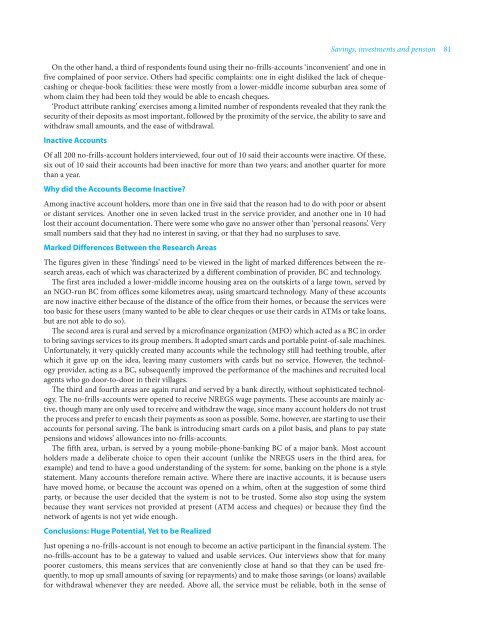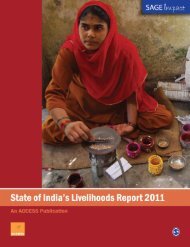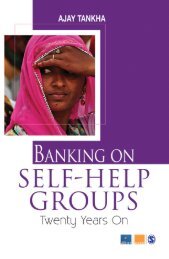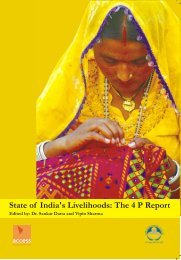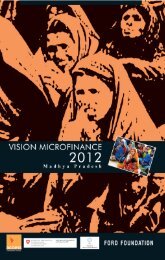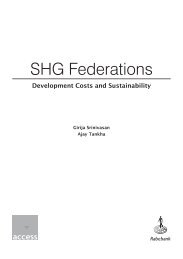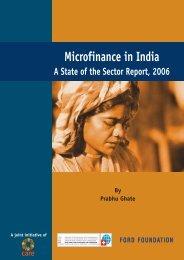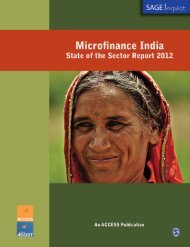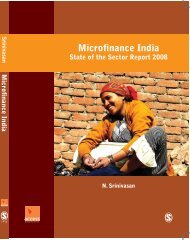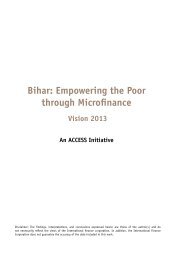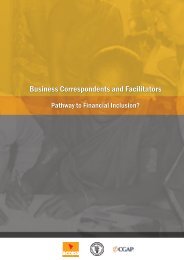80 MICROFINANCE INDIAANNEX 6.2Findings <strong>of</strong> Microsave on No-Frills-AccountsThe studies focused on opening and usage <strong>of</strong> no-frills-accounts. Interviews were conducted in five placesin Uttar Pradesh and Delhi, with staff and customers <strong>of</strong> four banks (ICICI Bank, Union Bank, A DistrictCooperative Bank and Baroda Grameen Bank), an MFO (CASHPOR), an NGO (AWARD), a technologyprovider (FINO), and a mobile-banking initiative (Eko). These places and entities were chosen to accommodatea variety <strong>of</strong> no-frills-accounts situations:• Both where <strong>the</strong> no-frills-account was provided and served directly by a bank with no BC and where<strong>the</strong> bank worked through a business correspondent.• Both where <strong>the</strong> no-frills-accounts were <strong>of</strong>fered to <strong>the</strong> general public and where <strong>the</strong>y were <strong>of</strong>fered to ruralworkers receiving wages from <strong>the</strong> government’s make-work scheme, <strong>the</strong> National Rural EmploymentGuarantee Act (NREGA).• Both where account management was manual and where it was managed through IT equipment (portablepoint-<strong>of</strong>-sale devices and mobile phones).The sample <strong>of</strong> 243 respondents is not statistically representative <strong>of</strong> no-frills-account account holdersnationally, but is enough to provide reliable insights.Pr<strong>of</strong>ile <strong>of</strong> <strong>the</strong> RespondentsThree out <strong>of</strong> five were illiterate (though not necessarily unschooled) and almost two-thirds depended onagricultural or o<strong>the</strong>r wage labour. There were an equal number <strong>of</strong> men and women. Almost three-quarterswere <strong>of</strong> prime working age—between 26 and 45.Reasons for Opening a no-frills-accountHalf <strong>the</strong> no-frills-account holders or ex-account holders interviewed opened <strong>the</strong>ir no-frills-account in orderto handle small savings. Some o<strong>the</strong>rs opened <strong>the</strong>ir accounts because to do so was ‘easy and cheap’ orbecause <strong>the</strong>y were encouraged to do so by someone else.An important minority, 20 per cent <strong>of</strong> <strong>the</strong> total, but virtually everyone in <strong>the</strong> specific research area,opened <strong>the</strong>ir accounts to receive payments under <strong>the</strong> government’s provide-work scheme, that is, NREGS.Were <strong>the</strong> Reasons for Opening <strong>the</strong> no-frills-account Fulfilled?Almost half <strong>of</strong> <strong>the</strong> respondents said ‘yes’. Of <strong>the</strong> remainder, most said that <strong>the</strong> no-frills-account was in someway inconvenient (<strong>the</strong> bank too distant, for example). Some said <strong>the</strong>y found <strong>the</strong> account did not <strong>of</strong>fer <strong>the</strong>facilities that <strong>the</strong>y had hoped for. (cheque books and loans were <strong>the</strong> most frequently mentioned)Was <strong>the</strong> no-frills-account <strong>the</strong> first bank account opened?For almost two-thirds <strong>of</strong> account holders, <strong>the</strong> no-frills-account was <strong>the</strong> first bank account <strong>the</strong>y ever opened;however, more than half <strong>of</strong> <strong>the</strong> respondents said that <strong>the</strong>re is someone in <strong>the</strong>ir family who already has abank account.Levels <strong>of</strong> UnderstandingTwo thirds <strong>of</strong> those who had opened an no-frills-account had a basic understanding <strong>of</strong> <strong>the</strong> nature andworkings <strong>of</strong> <strong>the</strong>ir account.Frequency <strong>of</strong> Transactions in Active AccountsOf <strong>the</strong> 121 account holders interviewed who are actively using <strong>the</strong>ir no-frills-account, one in six said <strong>the</strong>ytransact daily and ano<strong>the</strong>r one in four transact weekly. Altoge<strong>the</strong>r, 58 per cent said <strong>the</strong>y transacted at leastonce a month. Many <strong>of</strong> <strong>the</strong>se were in areas served by BC agents equipped with biometrically enabled point<strong>of</strong>-salesdevices. A fur<strong>the</strong>r 20 per cent transacted whenever <strong>the</strong>ir NREGS wage was paid in.Likes and Dislikes, and Ranking <strong>of</strong> Account Features by ImportanceOne third <strong>of</strong> respondents rated <strong>the</strong>ir account easy to open and manage, cheap, and <strong>of</strong>fering good service.A quarter liked <strong>the</strong> proximity and <strong>the</strong> fact that <strong>the</strong>y could transact in small amounts: this view, again, camemostly from those served on <strong>the</strong>ir doorstep by agents.
On <strong>the</strong> o<strong>the</strong>r hand, a third <strong>of</strong> respondents found using <strong>the</strong>ir no-frills-accounts ‘inconvenient’ and one infive complained <strong>of</strong> poor service. O<strong>the</strong>rs had specific complaints: one in eight disliked <strong>the</strong> lack <strong>of</strong> chequecashingor cheque-book facilities: <strong>the</strong>se were mostly from a lower-middle income suburban area some <strong>of</strong>whom claim <strong>the</strong>y had been told <strong>the</strong>y would be able to encash cheques.‘Product attribute ranking’ exercises among a limited number <strong>of</strong> respondents revealed that <strong>the</strong>y rank <strong>the</strong>security <strong>of</strong> <strong>the</strong>ir deposits as most important, followed by <strong>the</strong> proximity <strong>of</strong> <strong>the</strong> service, <strong>the</strong> ability to save andwithdraw small amounts, and <strong>the</strong> ease <strong>of</strong> withdrawal.Inactive AccountsOf all 200 no-frills-account holders interviewed, four out <strong>of</strong> 10 said <strong>the</strong>ir accounts were inactive. Of <strong>the</strong>se,six out <strong>of</strong> 10 said <strong>the</strong>ir accounts had been inactive for more than two years; and ano<strong>the</strong>r quarter for morethan a year.Why did <strong>the</strong> Accounts Become Inactive?Among inactive account holders, more than one in five said that <strong>the</strong> reason had to do with poor or absentor distant services. Ano<strong>the</strong>r one in seven lacked trust in <strong>the</strong> service provider, and ano<strong>the</strong>r one in 10 hadlost <strong>the</strong>ir account documentation. There were some who gave no answer o<strong>the</strong>r than ‘personal reasons’. Verysmall numbers said that <strong>the</strong>y had no interest in saving, or that <strong>the</strong>y had no surpluses to save.Marked Differences Between <strong>the</strong> Research AreasThe figures given in <strong>the</strong>se ‘findings’ need to be viewed in <strong>the</strong> light <strong>of</strong> marked differences between <strong>the</strong> researchareas, each <strong>of</strong> which was characterized by a different combination <strong>of</strong> provider, BC and technology.The first area included a lower-middle income housing area on <strong>the</strong> outskirts <strong>of</strong> a large town, served byan NGO-run BC from <strong>of</strong>fices some kilometres away, using smartcard technology. Many <strong>of</strong> <strong>the</strong>se accountsare now inactive ei<strong>the</strong>r because <strong>of</strong> <strong>the</strong> distance <strong>of</strong> <strong>the</strong> <strong>of</strong>fice from <strong>the</strong>ir homes, or because <strong>the</strong> services weretoo basic for <strong>the</strong>se users (many wanted to be able to clear cheques or use <strong>the</strong>ir cards in ATMs or take loans,but are not able to do so).The second area is rural and served by a micr<strong>of</strong>inance organization (MFO) which acted as a BC in orderto bring savings services to its group members. It adopted smart cards and portable point-<strong>of</strong>-sale machines.Unfortunately, it very quickly created many accounts while <strong>the</strong> technology still had teething trouble, afterwhich it gave up on <strong>the</strong> idea, leaving many customers with cards but no service. However, <strong>the</strong> technologyprovider, acting as a BC, subsequently improved <strong>the</strong> performance <strong>of</strong> <strong>the</strong> machines and recruited localagents who go door-to-door in <strong>the</strong>ir villages.The third and fourth areas are again rural and served by a bank directly, without sophisticated technology.The no-frills-accounts were opened to receive NREGS wage payments. These accounts are mainly active,though many are only used to receive and withdraw <strong>the</strong> wage, since many account holders do not trust<strong>the</strong> process and prefer to encash <strong>the</strong>ir payments as soon as possible. Some, however, are starting to use <strong>the</strong>iraccounts for personal saving. The bank is introducing smart cards on a pilot basis, and plans to pay statepensions and widows’ allowances into no-frills-accounts.The fifth area, urban, is served by a young mobile-phone-banking BC <strong>of</strong> a major bank. Most accountholders made a deliberate choice to open <strong>the</strong>ir account (unlike <strong>the</strong> NREGS users in <strong>the</strong> third area, forexample) and tend to have a good understanding <strong>of</strong> <strong>the</strong> system: for some, banking on <strong>the</strong> phone is a stylestatement. Many accounts <strong>the</strong>refore remain active. Where <strong>the</strong>re are inactive accounts, it is because usershave moved home, or because <strong>the</strong> account was opened on a whim, <strong>of</strong>ten at <strong>the</strong> suggestion <strong>of</strong> some thirdparty, or because <strong>the</strong> user decided that <strong>the</strong> system is not to be trusted. Some also stop using <strong>the</strong> systembecause <strong>the</strong>y want services not provided at present (ATM access and cheques) or because <strong>the</strong>y find <strong>the</strong>network <strong>of</strong> agents is not yet wide enough.Conclusions: Huge Potential, Yet to be RealizedJust opening a no-frills-account is not enough to become an active participant in <strong>the</strong> financial system. Theno-frills-account has to be a gateway to valued and usable services. Our interviews show that for manypoorer customers, this means services that are conveniently close at hand so that <strong>the</strong>y can be used frequently,to mop up small amounts <strong>of</strong> saving (or repayments) and to make those savings (or loans) availablefor withdrawal whenever <strong>the</strong>y are needed. Above all, <strong>the</strong> service must be reliable, both in <strong>the</strong> sense <strong>of</strong>Savings, investments and pension 81
- Page 1:
Microfinance India
- Page 4 and 5:
Copyright ©ACCESS Development Serv
- Page 7 and 8:
List of Tables, Figures, Boxes,Abbr
- Page 9 and 10:
List of Tables, Figures, Boxes, Abb
- Page 11 and 12:
List of Tables, Figures, Boxes, Abb
- Page 13 and 14:
ForewordAfter coping with the uncer
- Page 15:
ForewordxvI’m happy that the 2010
- Page 18 and 19:
xviiiMICROFINANCE INDIASadhan’s c
- Page 20 and 21:
2 MICROFINANCE INDIARBI is focused
- Page 22 and 23:
4 MICROFINANCE INDIAcent in 2009. 1
- Page 24 and 25:
6 MICROFINANCE INDIAMFIs did not se
- Page 26:
8 MICROFINANCE INDIA(DFID) had prio
- Page 29:
Overview—the juggernaut decelerat
- Page 32 and 33:
14 MICROFINANCE INDIASavings Perfor
- Page 34 and 35:
16 MICROFINANCE INDIAamply clear th
- Page 36 and 37:
18 MICROFINANCE INDIAyears have a l
- Page 38 and 39:
20 MICROFINANCE INDIAThe study whil
- Page 40 and 41:
22 MICROFINANCE INDIAper cent peopl
- Page 42 and 43:
24 MICROFINANCE INDIAState andname
- Page 44 and 45:
26 MICROFINANCE INDIAinnovation tha
- Page 46 and 47:
28 MICROFINANCE INDIAANNEX 2.2Micro
- Page 48 and 49: 30 MICROFINANCE INDIARegion/StateF
- Page 50 and 51: 32 MICROFINANCE INDIAMFIs in the mi
- Page 52 and 53: 34 MICROFINANCE INDIAreturn-on-asse
- Page 54 and 55: 36 MICROFINANCE INDIAneeds introspe
- Page 56 and 57: 38 MICROFINANCE INDIACompetition an
- Page 58 and 59: 40 MICROFINANCE INDIAIt looks unfai
- Page 60 and 61: 42 MICROFINANCE INDIAwas a commenda
- Page 62 and 63: 44 MICROFINANCE INDIAterms of ideas
- Page 64 and 65: 46 MICROFINANCE INDIAfast growth of
- Page 66 and 67: 48 MICROFINANCE INDIASecond wave of
- Page 68 and 69: 50 MICROFINANCE INDIABut to make MF
- Page 70 and 71: 52 MICROFINANCE INDIA11. In Chapter
- Page 72 and 73: 54 MICROFINANCE INDIAflow of funds
- Page 74 and 75: 56 MICROFINANCE INDIAThe MHP requir
- Page 76 and 77: 58 MICROFINANCE INDIAto boomerang o
- Page 78 and 79: 60 MICROFINANCE INDIAlocal populati
- Page 80 and 81: 62 MICROFINANCE INDIAInvestor Inves
- Page 82 and 83: 64 MICROFINANCE INDIAand 3.1 in Eas
- Page 84 and 85: 66 MICROFINANCE INDIAto have the la
- Page 86 and 87: 68 MICROFINANCE INDIAand it also ha
- Page 89 and 90: Savings, investmentsand pensionMicr
- Page 91 and 92: Savings, investments and pension 73
- Page 93 and 94: Savings, investments and pension 75
- Page 95 and 96: Savings, investments and pension 77
- Page 97: Savings, investments and pension 79
- Page 101 and 102: Policy environmentand regulationThe
- Page 103 and 104: Policy environment and regulation 8
- Page 105 and 106: Policy environment and regulation 8
- Page 107 and 108: Technology in microfinanceMicrofina
- Page 109 and 110: Technology in microfinance 91Other
- Page 111 and 112: Technology in microfinance 93100%90
- Page 113 and 114: Social performance,transparency and
- Page 115 and 116: Social performance, transparency an
- Page 117 and 118: Social performance, transparency an
- Page 119 and 120: Social performance, transparency an
- Page 121 and 122: Table 9.2 Mission orientation and a
- Page 123 and 124: Social performance, transparency an
- Page 125: Social performance, transparency an
- Page 128 and 129: 110 MICROFINANCE INDIATable 10.1 Wh
- Page 130 and 131: 112 MICROFINANCE INDIAtransfer serv
- Page 132 and 133: 114 MICROFINANCE INDIAManaging BC n
- Page 134 and 135: 116 MICROFINANCE INDIAdoes not seem
- Page 136 and 137: 118 MICROFINANCE INDIASHG Sahayog N
- Page 138 and 139: 120 MICROFINANCE INDIATo conclude,
- Page 140 and 141: 122 MICROFINANCE INDIA6. Further, b
- Page 142 and 143: 124 MICROFINANCE INDIASl. No. Recom
- Page 144 and 145: 126 MICROFINANCE INDIA• To provid
- Page 146 and 147: 128 MICROFINANCE INDIAInstitutional
- Page 149 and 150:
AppendixTable A.1 Fact sheet on cov
- Page 151 and 152:
Appendix 133Name of the bankCommerc
- Page 153 and 154:
Appendix 135mobilization by SHGs an
- Page 155 and 156:
BibliographyThe Union Budget 2010-1
- Page 157:
Bibliography 139‘How India Earns,


